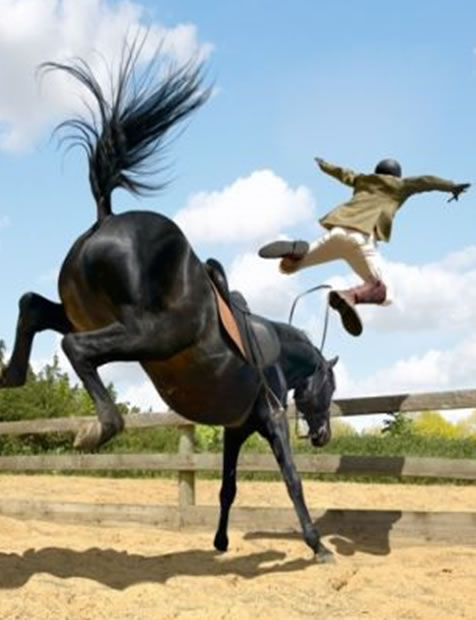Dec. 2004 Proverb: “A boisterous horse needs a boisterous bridle.” – Hausa (Nigeria)
A bit with fire, the medicine for a mad horse. (Literal English translation)
A boisterous horse needs a boisterous bridle. (Meaning English translation)

Hausa (Nigeria) Proverb
Background, Explanation, Meaning and Everyday Use
Sometimes, this proverb is heard at the Emir’s Palace in Kano, Nigeria with a variation of tirarren instead of mahaukacin. But this does not convey the same intensity and severity of behavior as the word mahaukacin — a runaway horse is more dangerous than a jibbing horse.
This Hausa proverb is based on the belief that that only a strong bit – a strong bit has a thicker and more sharply edged metal than a light bit – can control a runaway type horse as it can exert more pressure and pain on the corners of the mouth of a horse than a thin smooth edged metal bit. That is why, in modern times, race horses as well as well-fed horses prone to this behavior are ridden with bridles having very thick snaffle bits such as eggbutt snaffle, loose ring German mouth snaffle, etc. These bits slow down and stop an unwilling horse by exerting more pressure and pain in the mouth while pulling back the reins. This proverb means that as a “bit with fire” (a very strong and sharp bit) is needed to stop or control a mad (runaway type, vice-ridden) horse, so also a very strong punitive measure is needed to discipline the recalcitrant.
 The governor of a state in a democratic society, for example, behaves rashly and implements policies as he likes without any regard to the wishes of the people to such an extent that the suffering becomes unbearable. All advice and persuasion fails and there is a danger of the collapse of the state. Therefore one member suggests impeachment as the only solution and quotes this proverb.
The governor of a state in a democratic society, for example, behaves rashly and implements policies as he likes without any regard to the wishes of the people to such an extent that the suffering becomes unbearable. All advice and persuasion fails and there is a danger of the collapse of the state. Therefore one member suggests impeachment as the only solution and quotes this proverb.
An equivalent proverb in English is Desperate situations require desperate remedies. However, the English version is a literal one while the Hausa proverb is a metaphorical proverb with more punch and striking imagery.
Biblical Parallels
“O bitter was that day–and yet not bitter–when that bitter tyrant of the Greeks quenched fire with fire in his cruel caldrons” (4 Maccabees 18:20).
Contemporary Use and Religious Application
This is a proverb that is used for advising people to handle rough situations with firmness and severity. In terms of its religious application, it can be used innovatively to create a new meaning in a positive manner. For example, in handling the seven deadly sins, one needs to be tough in dealing with them. A bad habit like womanising cannot be overcome with gentle measures to curb it. One should use the fiery bit of ruthless determination born out of wisdom to control the mad, runaway horse of the mind, eschewing bad company, resisting to go to places and meeting people where sexual desires are roused, etc. The antidote for sin is worship of God. It is the fiery bit that burns the vice-ridden mind and turns it into a disciplined and spirited steed that runs the course of life to win the blessings of God for eternal happiness.
MODERATOR’S NOTE: Chilukuri Bhuvaneswar‘s collection of 325 proverbs in Hausa on horses is an “event” in the history of oral literature in Africa. It is probably the largest collection on an animal in African oral literature. In addition he also collected many proverbs on horses in Kanuri, Fulani, Bura, and Batchama. His discovery of a sub-tale class of folktales, namely, equine folktales in Kanuri is another feather to his cap. See Chilukuri Bhuvaneswar. The African Horse (pages 33-34). Maiduguri: University of Maiduguri, 1994.
Professor Chilukuri Bhuvaneswar
CIEFL
Hyderabad, India
Email: bhuvaneswarc@yahoo.co.in
